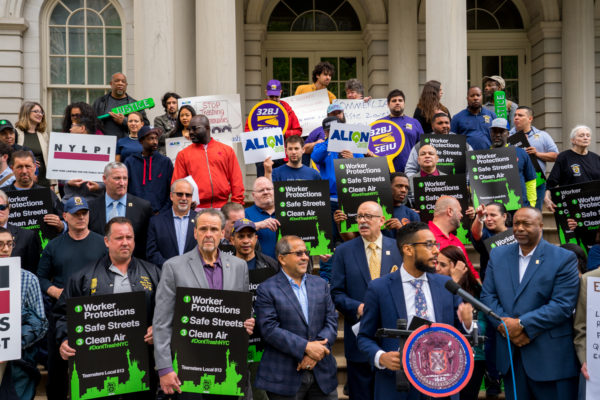Recently, Maritza Silva Farrell, executive director of ALIGN NY—a Veatch grantee working at the intersection of the labor and environmental movements—was a guest on Power Station, a podcast that explores efforts to create change in overlooked and underinvested communities. The host of the podcast, Anne Pasmanick, described the 40-minute conversation with Maritza as a “master class” in organizing for systemic and transformational change. Listen to the podcast here.
Throughout the conversation, the two speak about the decades-long organizing efforts by ALIGN NY and other groups that led to major policy changes in New York, including a 2019 bill that completely restructured the way the city handles commercial waste. Maritza emphasized the importance of collaborating across grassroots organizing sectors to make large-scale, systemic changes like this possible.
“We had to engage environmental justice organizations that have been bearing the brunt of the waste in their neighborhoods, and workers who are the ones who picked up the garbage in our neighborhoods in those commercial sites and businesses, who were also mistreated by their employers” Maritza said. “You bring all those groups together and you see there is a way to reform a system that can align and address everybody’s problems.”
 Image: Members of ALIGN-NY join a press conference to push for passage
Image: Members of ALIGN-NY join a press conference to push for passage
of the 2019 commercial waste reform law in NYC
The resulting law—which awards contracts to handle commercial waste according to a new set of strict environmental and labor practices—is now looked to as an example of how labor and environmental organizers can work together to create meaningful change across the country.
Maritza said it is important for grassroots social justice campaigns to collaborate in this way, and realize that their “real enemy” is often the same: corporations that are only thinking about profit and the bottom line. “They are not going to be thinking about how to advance health and protections in the workplace, or benefits for workers, of the impact of building big developments in neighborhoods that are mostly black and brown,” she said.
Together, grassroots groups can then focus on applying pressure on government leaders “to make sure the right regulations are in place, informed by the people and their constituents,” Maritza said. If we don’t work together, she continued, “the polarization will allow for the corporations and many of these folks who don’t believe in racial justice, climate justice or economic justice to continue to win and oppress our communities.”


